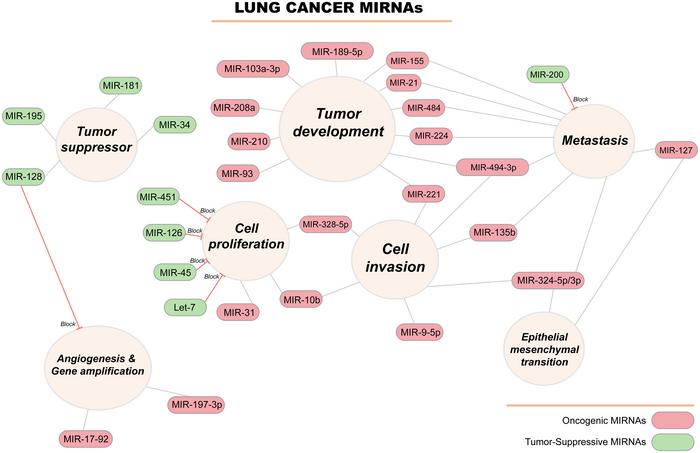
Lung cancer remains one of the deadliest malignancies worldwide, with a notoriously poor prognosis and a complex biological landscape that challenges both early detection and effective treatment. While extensive progress has been made in genomics and targeted therapies, recent advancements highlight the intricate involvement of microRNAs (miRNAs) as critical regulators in lung cancer pathogenesis and progression. These small, approximately 22-nucleotide non-coding RNA molecules modulate gene expression post-transcriptionally by binding primarily to the 3’ untranslated regions (3’ UTRs) of target messenger RNAs (mRNAs), causing translational repression or mRNA degradation. Understanding the oncogenic and tumor-suppressive functions of miRNAs in lung cancer unveils novel avenues for diagnostic and therapeutic strategies.
MicroRNAs influence virtually all hallmarks of cancer, including unchecked proliferation, evasion of apoptosis, angiogenesis, invasiveness, and metastatic dissemination. In lung cancer, aberrant expression profiles of miRNAs disrupt the delicate balance of oncogenes and tumor suppressor genes, tipping the scale toward malignancy. For example, miR-21, a well-characterized oncogenic miRNA, is consistently upregulated in non-small cell lung cancer (NSCLC) and small cell lung cancer (SCLC), where it promotes cell proliferation and inhibits programmed cell death by targeting multiple tumor suppressor transcripts. Its broad impact on pathways such as PTEN/PI3K/AKT underscores its pivotal role in enhancing tumor aggressiveness and chemoresistance.
The biogenesis of miRNAs is tightly controlled through a multi-step process beginning with transcription by RNA polymerase II, generating primary miRNA (pri-miRNA) transcripts. These transcripts undergo microprocessor complex-mediated cleavage by Drosha and DGCR8 within the nucleus to produce precursor miRNAs (pre-miRNAs), which are subsequently exported to the cytoplasm. There, the RNase III enzyme Dicer processes pre-miRNAs into mature miRNA duplexes. One strand, the guide strand, is incorporated into the RNA-induced silencing complex (RISC) to execute gene regulation. Dysregulation at any stage of this pathway – whether through genetic mutations, epigenetic modifications, or altered expression of biogenesis factors – results in miRNA imbalances that contribute substantially to lung carcinogenesis.
Exosomes, the extracellular vesicles secreted by tumor cells, carry miRNAs and other molecules that modulate the tumor microenvironment and facilitate metastatic niches. These exosomal miRNAs serve as messengers, reprogramming stromal cells, promoting angiogenesis, or suppressing immune surveillance. Detection of circulating exosomal miRNAs in plasma represents a promising non-invasive biomarker platform for early lung cancer diagnosis, monitoring therapeutic response, and predicting relapse.
The dichotomous nature of miRNAs in lung cancer is exemplified by their classification as either oncogenic (oncomiRs) or tumor-suppressive miRNAs. OncomiRs, such as miR-155 and miR-10b, stimulate tumor growth, invasion, and metastasis by targeting genes that regulate apoptosis and cell adhesion. Their overexpression often correlates with poor prognosis and advanced clinical stages. Conversely, tumor-suppressor miRNAs like miR-1 and miR-7 inhibit malignant transformation by repressing oncogenic signaling pathways, including the EGFR and KRAS cascades. The frequent downregulation of these miRNAs in tumor cells removes critical restraints on cellular proliferation and survival, accelerating cancer progression.
Therapeutic exploitation of miRNA pathways is an emerging frontier in lung cancer treatment. Strategies under investigation include the use of antagomirs or locked nucleic acid (LNA) inhibitors to silence oncogenic miRNAs, thereby restoring tumor suppressor gene activity. Alternatively, synthetic miRNA mimics can replenish lost tumor-suppressive miRNAs, reinstating their regulatory functions. Delivery approaches leveraging nanoparticle systems or exosome-mimetic vesicles are being optimized to enhance specificity and minimize off-target effects, addressing critical challenges in the clinical translation of miRNA-based therapies.
In addition to their therapeutic promise, miRNAs offer unprecedented potential as biomarkers for lung cancer screening and prognosis. Profiling miRNA signatures from patient-derived biofluids enables not only earlier detection of neoplastic changes but also stratification of patients based on likely treatment responsiveness. This fits within the broader framework of precision oncology, where individualized molecular landscapes inform personalized therapeutic regimens to maximize efficacy while limiting toxicity.
Despite the exciting progress, miRNA research in lung cancer faces significant complexity. The pleiotropic nature of miRNAs, often regulating multiple target genes across diverse pathways, necessitates comprehensive mapping of miRNA-mRNA interactomes within specific cellular contexts. Furthermore, the influence of tumor heterogeneity, epigenetic background, and external environmental factors complicates the delineation of causative versus correlative roles of miRNAs in cancer biology.
Further elucidation of the mechanisms governing miRNA expression and function in lung cancer will depend on integrative approaches combining high-throughput sequencing, single-cell analysis, and functional genomics. Such studies will be instrumental in uncovering novel miRNA regulatory circuits and their interplay with canonical oncogenic signaling networks. The integration of multiomics data promises to enhance our understanding of lung tumorigenesis and identify more robust molecular targets.
In sum, microRNAs represent powerful molecular switches that intricately regulate lung cancer development and progression. By manipulating miRNA networks, researchers hope to overcome the formidable therapeutic resistance and heterogeneity that have long stymied lung cancer management. As miRNA-based diagnostics and therapeutics advance toward clinical applications, they are poised to revolutionize the landscape of lung cancer care, offering hope for improved survival and quality of life in patients afflicted with this devastating disease.
Subject of Research: Oncogenic potential and regulatory roles of microRNAs in lung cancer pathogenesis and therapy.
Article Title: Unraveling the Oncogenic Potential of microRNAs in Lung Cancer: A Narrative Review Article
News Publication Date: 19-Mar-2025
Web References:
https://www.xiahepublishing.com/journal/csp
http://dx.doi.org/10.14218/CSP.2025.00001
Image Credits: Mohammad Bayat, Ali Moradi
Keywords: MicroRNA, Carcinogenesis, Target mRNA, Scientific publishing, Cancer screening
Tags: cancer hallmarks and miRNAsdiagnostics in lung cancergene expression regulation by miRNAslung cancer pathogenesismicroRNA therapeutic strategiesmicroRNAs in lung cancermiR-21 and lung cancernon-coding RNA in cancer researchoncogenic microRNAs in NSCLCrole of miRNAs in cancertargeted therapies in lung cancertumor suppressor microRNAs in lung cancer





